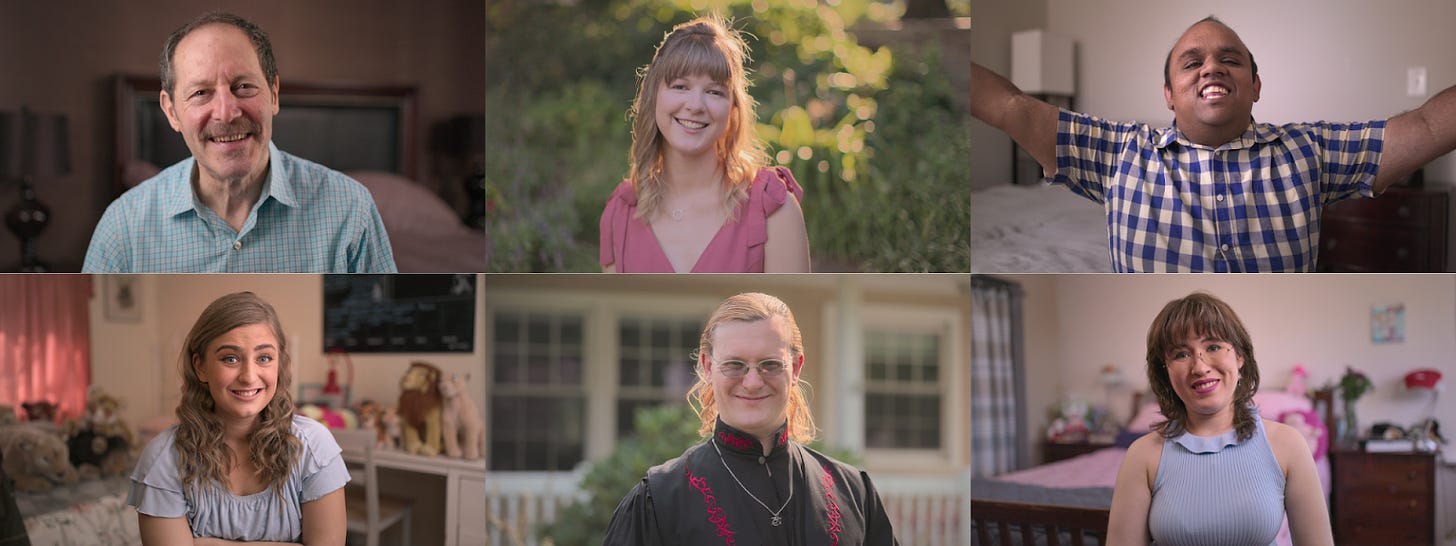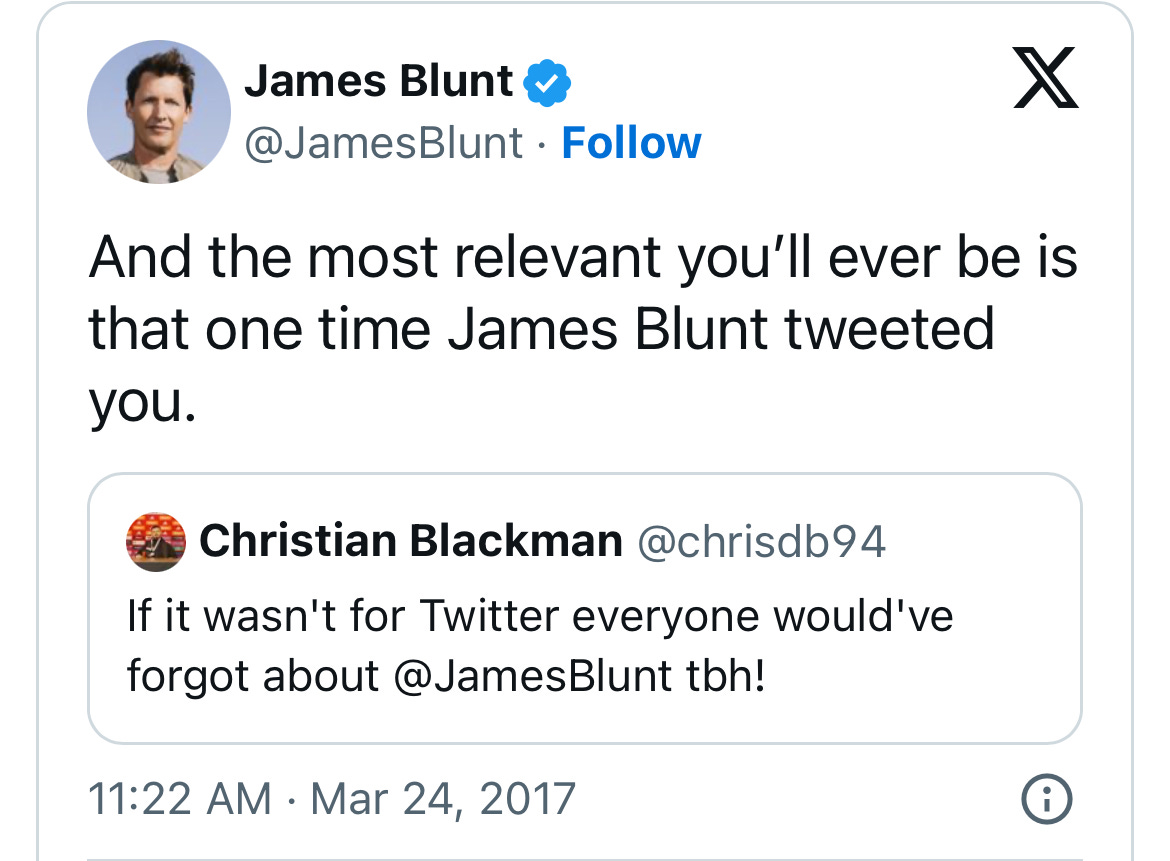Love on the Spectrum (& James Blunt)
The power of compassionate story-telling to build bridges and redeem reputations
Going mid-to-low brow again (having previously admitted my love of watching people watching TV) with another popular-culture Antidoter nomination: ‘Love on the Spectrum’ on Netflix (the US version) - a fascinating and incredibly moving insight into the attempted love-lives of those on the autism spectrum.
Given my ongoing obsession with all the various lines along which we’re increasingly polarising, it struck me how few people I come across in my daily life who are significantly neuro-diverse. With the exception of exposure via the odd high profile film portrayal (e.g. ‘Rain Man’ or ‘What’s Eating Gilbert Grape’) most of us seldom interact with those who are so far along the spectrum that they almost inhabit different worlds.
Whilst TV-browsing, the concept of the show struck me as a little distasteful at first Voyeurism, perhaps or exploitative light entertainment (comedy?) out of those potentially unable to understand how their awkward experiments in dating would be perceived. But to my surprise and delight, I found myself enthralled by its compassionate story-telling. I fell in love with many of the ‘stars’ and became hugely invested in their stories - each episode evoking laughter, tears and soul searching and ultimately, the profound question: What is ‘normal’? Trailer here.
There was Abbey, a child-like, Disney-loving 23 year old, who, from her teddy and doll adorned bedroom, commented matter-of-factly that her life was like that of her hero, Ariel - a mermaid out of water, with no voice in the world; Subodh, a 33 year old maths genius who thought long and hard before responding that he hadn’t been on a date for… 33 years; James, a 36 year old cosplay fan with detailed stories for each of the swords on his wall, but an inability to make eye contact or hold a conversation beyond pleasantries.
Their families’ love, support and desire for them to have companionship in their lives was beautiful and heartbreaking. An older gentleman, Steve - now living independently with the help of a carer - proudly showed us old framed photos of him as a child sitting on his father’s knee - a much-loved, departed father who had evidently supported, protected him and brought him up with the most impeccable,1940s language, charm and manners: ‘To have a lovely lady, would be an absolute dream.’
The participants are from a much less fashionable end of the spectrum than the neuro-diversity conversation seems to focus on these days, where functioning ADHD or dyslexia can be presented almost as a desirable super-power with rates of self-diagnosis (and medicalisation) growing exponentially. Whilst I entirely understand and appreciate the desire to normalise neuro-diversity and reduce stigma, I can’t help but wonder how far the much wider expansion of the definition has taken time, money and already-stretched professional resources from those at the extremes. Indeed, it has been a source of frustration to me whilst at the Equality and Human Rights Commission (The EHRC - the Government regulator on whose board I sit) that Disability - one of the key protected characteristics we are mandated to protect - has been so sidelined in the national conversation in preference for such heated-debate around others.
The sheer diversity within the ‘disability’ definition (with all their various needs) is complicated, and not a field I know enough about to comment meaningfully on (unlike many who might try) so I won’t pontificate further. Instead, I just appreciate those story-tellers who help us to better understand those so different from ourselves.
Other TV story-telling that has opened my eyes recently includes the recent Lewis Capaldi and James Blunt documentaries. I found both shocking in different ways: watching the former’s physical ticks take over his life as the pressure to repeat his early success piled on (alongside his loving family’s distress); and observing the cruel impact on someone of a whole country deciding overnight that they are deeply uncool and embarrassing for being ‘posh’ and holding the top chart spot for too long. There’s something dark and unpleasant in our societal need to put people on a pedestal and then require them to either continue to perform at that same level or so quickly kick it away. The celebrities piling in on Blunt came across as particularly pathetic (with the notable exception of Ed Sheeran). Meme culture can be utterly brutal and destroy reputations overnight.
The hugely sympathetic ‘Love on the Spectrum’ and the Glastonbury crowd singing for Lewis Capaldi when his ticks meant he couldn’t continue are beautiful reminders of our capacity for compassion and humanity in a world that I often worry has become increasingly intolerant of less fashionable, more complicated divergence. Certainly not of divergent worldviews or anyone deemed too ‘privileged’ to deserve the benefit of the doubt.
As always, when given the time and space within compelling story-telling to better understand those we think we don’t like or (for whatever reason) can’t identify with, we start to appreciate their experiences, fears, loves and intentions and become much less judgemental. This ‘All that we share’ Danish TV advert demonstrates this well, as does this Heineken advert which saw people with opposing views building a bar together.
Few are sadly capable or brave enough to James-Blunt their way out of adversity through wit and humour, but I wish more could or would try…






